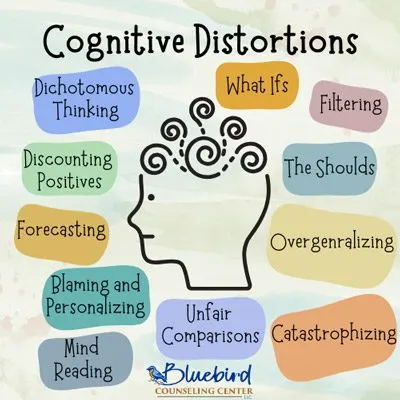
Understanding Cognitive Behavioral Therapy: Transforming Thoughts to Improve Emotional Well-Being
At Bluebird Counseling Center LLC, we prioritize empowering our clients to understand and manage their mental health effectively. One of the most effective methods we employ is Cognitive Behavioral Therapy (CBT). CBT is based on the idea that our thoughts, feelings, and behaviors are interconnected, and by changing our thought patterns, we can significantly influence our emotional responses and actions.
The Cycle of Thoughts, Emotions, and Behaviors
Understanding the CBT cycle begins with recognizing how an event can trigger an automatic thought, which then leads to an emotional reaction followed by a behavioral response. Here’s a breakdown of this process:
- Triggering Event: An external event or situation occurs. This could be anything from receiving feedback at work to a comment made by a friend.
- Automatic Thought: As a response, we have an automatic thought, which is often a quick, instinctive reaction. For example, you might think, “I always mess things up” after receiving constructive critique.
- Emotional Reaction: This thought triggers an emotional reaction. In our example, the automatic thought could lead to feelings of anxiety, sadness, or frustration.
- Behavioral Response: Finally, these emotions influence how we behave. A common response to the previous scenario might be avoiding future challenges or withdrawing from social situations.
- Outcome: The culmination of this cycle affects the overall outcome of the situation, potentially reinforcing negative patterns and feelings.
The Nature of Emotional Reactions
Many discussions around emotional management emphasize that while we can’t control our immediate emotional reactions, we do have some agency over our thoughts. It’s essential to recognize that while automatic thoughts arise spontaneously, the power we give those thoughts can be transformed.
By learning to identify and challenge these thoughts, we can reduce their detrimental impact on our emotional well-being.
Reframing Negative Thoughts
One of the critical aspects of CBT is reframing negative thoughts into more constructive perspectives. This approach not only helps in managing emotions but also promotes healthier behaviors. Typically, our negative thoughts fall into various categories known as cognitive distortions, which include:
- Dichotomous Thinking (Black and White Thinking): Viewing situations in black and white terms without recognizing the middle ground.
- Overgeneralizing: Making broad statements based on a single event (e.g., “I always fail.”).
- Filtering: Focusing exclusively on the negatives and filtering out any positives.
- Discounting Positives: Dismissing successes or positive feedback as irrelevant.
- Forecasting (Fortune Telling): Predicting negative outcomes without evidence.
- Catastrophizing: Imagining the worst possible scenario from a situation.
- The Shoulds: Holding rigid expectations about how things “should” be, leading to frustration.
- Mind Reading: Assuming we know what others are thinking, often negatively.
- Unfair Comparisons: Comparing ourselves unfavorably to others.
- Blaming and Personalizing: Projecting responsibility onto others or taking on too much personal blame.
- What Ifs: Getting caught in a cycle of hypothetical scenarios leading to anxiety.
Taking Back Control
Once you can identify the cognitive distortion at play, you can begin the process of reframing the thought. This doesn’t mean dismissing or invalidating your feelings; rather, it allows you to recognize that these thoughts are often unhelpful and not rooted in objective reality.
For instance, if you’re overgeneralizing by thinking, “I always fail,” you can reframe it to, “I had a setback this time, but I have succeeded in the past and can learn from this experience.”
The Benefits of Reframing
Reframing negative thoughts can significantly affect your feelings, actions, and the outcomes of various situations. By reducing the power these thoughts hold over you, you’re more likely to approach challenges with resilience and openness, leading to improved mental well-being.
At Bluebird Counseling Center LLC, we are committed to guiding you through this journey of understanding your thoughts and emotions. By employing techniques from Cognitive Behavioral Therapy, we can work together to deconstruct cognitive distortions and empower you to take control of your mental health.
If you find yourself struggling with negative thoughts, consider reaching out to us. Together, we can develop strategies to shift your mindset, promote emotional health, and cultivate a more positive, balanced life.
#BluebirdCounselingCenterLLC #Bluebirdcounselinglititz #therapy #counseling #lititz #mentalhealth #CBT #emotionalawareness #thoughtdistortions #refrmaingthoughts #cognitivebehavioraltherapy

